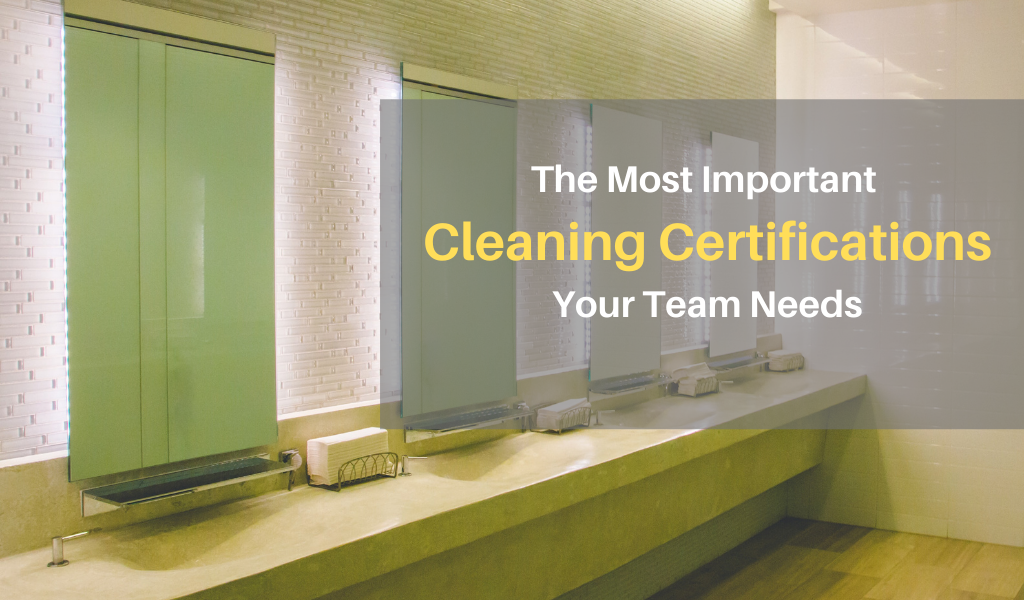There are cleaning certifications for any type of cleaning you can possibly imagine. Here are the ones that count.
There’s a funny thing about cleaning certifications – or any certifications, for that matter. They don’t always mean what they imply. Some industries, like the medical industry, offer respected, well-regulated certifications. On the other hand, you could also get your online certificate as a psychic for only $199. It’s a real thing.
But in the janitorial industry, there’s a little bit of both. For example, you could take a one-hour “certification” course on customer service and hang that pretty piece of paper in your office, but how much will that truly help you? You can read plenty of blog posts about customer service that would be just as effective. Alternatively, the Occupational Safety and Health Administration (OSHA) offers a 68-hour Public Sector Safety & Health Fundamentals Certificate Program for General Industry. That program covers topics like safety and health management, accident investigation, respiratory protection, and pandemic influenza preparedness.
We aren’t here to judge, and certainly, good customer is a vital part of any thriving business. Do you really need a certification for that, though? It seems pretty clear which of these certifications carries a bit more weight, and which of them might do more for improving your business.
While there’s nothing wrong with learning just for the sake of learning, when we’re talking about business, there are some certifications that mean more than others. You don’t have extra time and money to spend taking courses that won’t help you in running your business and attracting new clients.
It’s time to take charge of your cleaning services with Janitorial Manager, where you can manage cleaning jobs, communicate with clients, and so much more. Schedule a free demo today to learn more!
These are the cleaning certifications that will help you and your team stay safe, do better work, and attract more clients
As with anything, the right cleaning certifications for you might be very different than they would be for someone else. You won’t necessarily need every certification listed here. That said, these are the programs that will help you improve your business and put your clients’ minds at ease.
1. OSHA Safety and Health Specialist Certificate Program: General Industry
The OSHA Safety and Health Specialist Certificate Program is the one we mentioned above. No doubt, it is a serious commitment. You need seven required courses plus a minimum of four elective courses to complete this program. But it does cover a lot of very pertinent material. In addition to the topics already pointed out, one course that may be especially beneficial to your team is the Principles of Ergonomics. That course looks at risk factors for musculoskeletal injuries, including vibrations, repetitive movements, and manual lifting. OSHA offers this and other courses and certification through OSHA Training Institute Education Centers, which you can find in 37 locations throughout the U.S.
2. Certified Educational Facilities Professional (CEFP)
The CEFP credential is more than just a cleaning certification. If you work in facilities management in an educational institution, this is a high-level program that will “allow educational facilities professionals to become more competitive […] and more desirable.” The most significant prerequisite for this is time; the certification is only available to professionals with at least eight years of facilities management experience. And you’re required to recertify every four years. That said, if you specialize in working in educational environments, this could be a game-changer.
3. Cleaning Industry Management Standard-Green Building Certification
The Cleaning Industry Management Standard-Green Building Certification takes green cleaning certifications to the next level. For your customers who have or who are working to obtain the U.S. Green Building Council’s Leadership in Energy and Environmental Design (LEED) certification, the CIMS-GB is one of the options for compliance. By hiring you, once you have this certification, your customers aren’t just hiring a janitorial team; they’re also qualifying for their own certification.
4. Custodial Technician Certification
Like the CIMS-GB certification, the Certified Custodial Technician training is also offered through the ISSA. They provide a basic version, which covers customer service, the chemistry of cleaning, hard floors, carpeted floors, above-floor surface cleaning, and restroom cleaning. The advanced certificate includes higher-level training on hard floor and carpeted floor cleaning and cleaning above-floor surfaces.
5. Registered Building Service Manager
This certification, offered by the Building Service Contractors Association International (BSCAI), goes a little beyond most cleaning certifications. The topics include some of what you might expect: cleaning fabric, carpets, metal surfaces, safety, green cleaning, and customer relations. But it really dives into the full range of duties that you come across as a building services contractor. Personnel and general management, quality control, security, insurance, and chemicals are just some of the other topics included in this certification course.
6. Certified Building Service Executive
This certification, also from the BSCAI, could be just what you need if you’re looking for building management contracts. Topics covered here include insurance, taxes, bidding, accounting, contracts, training and supervision, and green cleaning.
7. Biohazard Cleanup
Even though we’re talking about commercial cleaning certifications, you can’t actually get certified in biohazard cleanup. By biohazard cleanup, we mean showing up to clean things like crime scenes, accidental traumatic deaths, hoarding cases, and the like. There’s nothing pretty about this, but it can be a very valuable service for people who need it. The tricky part here is that there are only two states, Florida and California, that require any kind of special permits to do this kind of work.
Even so, there are several other certifications and standards your commercial cleaning business could pursue to do this work. OSHA does require Bloodborne Pathogen training for any employee who may be exposed to bodily fluids. Other beneficial trainings in this line of work would include Hazardous Materials and Respiratory Protection.
And before we part, can we take a moment to offer you congratulations on taking the steps to improve your business? That takes some real dedication and professionalism. So know that whatever courses or certifications you take, you’re on your way to being a better professional.
Find out how easy it can be to stay in touch with employees and clients, bid on jobs, manage inventory, perform inspections, and more with Janitorial Manager. Check out a free demo to learn about all the great features!



Great article! Thank you for sharing this information. Very informative and useful for me. Keep it up.keep sharing, nice work